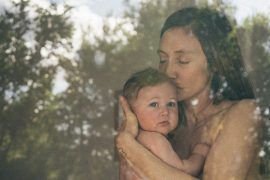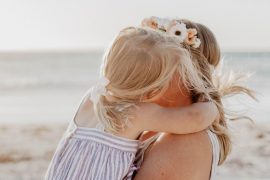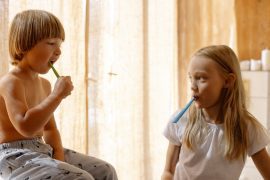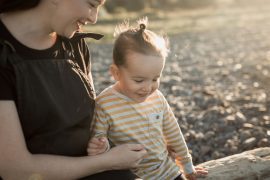My son had a kind of traumatic swimming lesson experience when he was about four. He didn’t really “remember it” remember it, but later when it was time to go to swimming lessons, even though he could already swim, and he loved swimming with his friends, when I said the words “swimming lessons,” he was immediately like, “Do I have to go?”
His brain remembered whatever that is, is a bad idea.
So, you know when we touch something hot, it’s painful. Our brain remembers that so we don’t do it again.
The memory’s really important to keep us safe. What we do in those first three years and beyond is crucial.
Even in those early first five or six years, that is when the brain has the most changes happening, most of them happening between zero to three. It’s the period of the most connections and brain change.
The second period of the most brain changes is during adolescence.
So let me say it this way, Sarah. What happens to us in our early months and years matters tremendously, but it doesn’t mean that our history is always our destiny.
So if we do have difficult things that happen to us in our early years, they are important, but it doesn’t mean that there’s no hope.
So, the brain is plastic [neuroplasticity] and we can make changes or process difficult things that happened.
One of the things I’ll say related to the science of this is [the existence of] regulatory circuitry, which is really the part of the brain that helps us regulate our emotions and regulate our attention and regulate our bodily states.
How does this apply to baby memory? Why don’t we remember being babies? And how is attachment related to that?
It’s the part of our brain that allows us to really be grounded and get back to baseline when we have challenges or adversity. The regulatory circuits of the brain are set up in the first 18 months.
So those early, early months, the way we respond to our infants by helping them feel safe, by helping them build trust that their needs will be seen and responded to – that we help regulate their bodily states and their emotions and their attention – by us doing that with them, we are actually setting up the regulatory circuits of the brain so that they have a greater capacity to regulate themselves better for the rest of their living years.
Sarah of Dandelion Seeds Positive Parenting:
That is a fantastically clear explanation of baby memory [and why we don’t remember being babies] – something that is, you know, worth volumes of encyclopedia materials. Thank you for that.
***
In Part 3 of our interview series, we’ll discuss co-regulation versus self-soothing – and the best way to help our children develop executive functioning skills. Stay tuned!
Originally published here.
Sarah R. Moore is an internationally published writer and the founder of Dandelion Seeds Positive Parenting. You can follow her on Facebook, Pinterest, and Instagram. She’s currently worldschooling her family. Her glass is half full.










